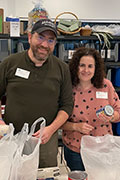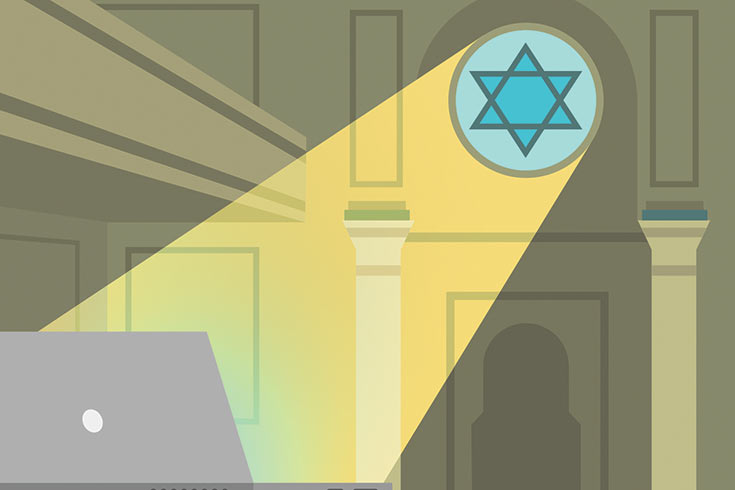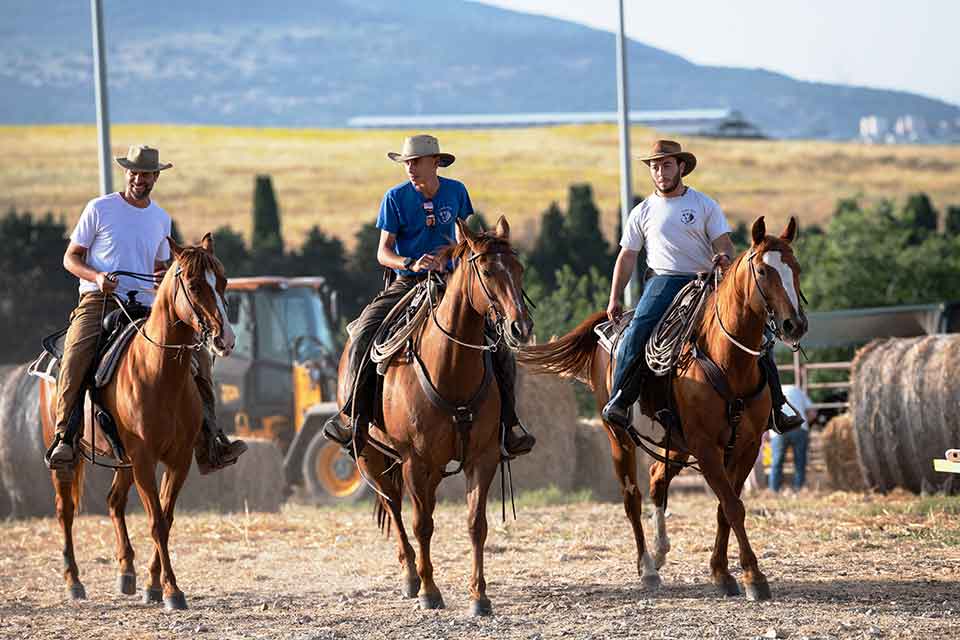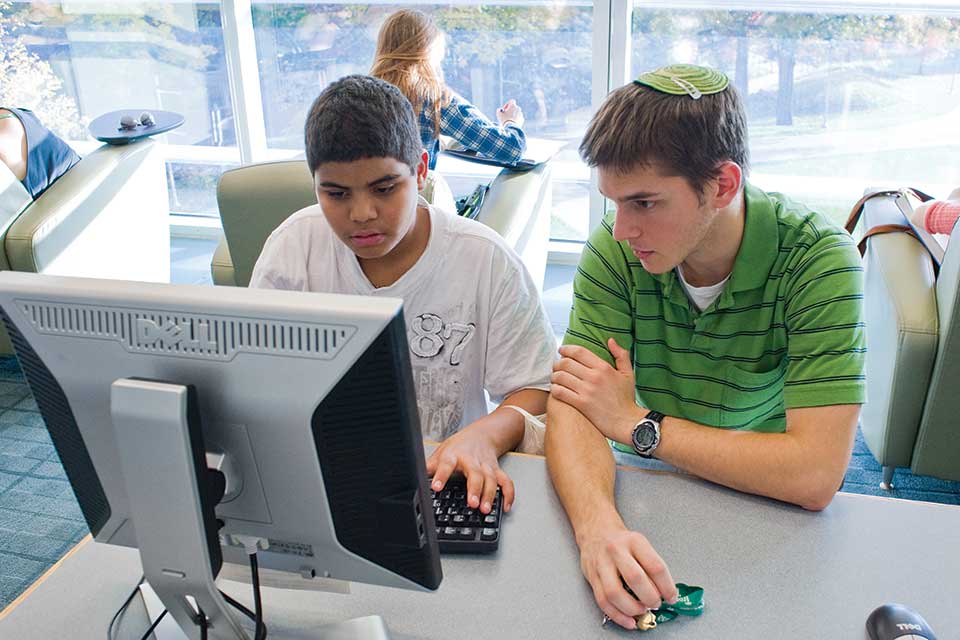What Repairing the World Means to Me
The phrase "repairing the world" lies at the heart of what Brandeis is all about.
This story was originally published on The Jewish Experience.
The expression derives from the Hebrew — tikkun olam means "world repair" — and reflects Brandeis' Jewish roots, though its meaning today is secular and universal. Mostly, it signifies the university and its community members’ commitment to making the world a better place.
It is often associated with political activism and a dedication to social justice, but others see it as an obligation to behave ethically and treat others with dignity and respect.
"The Jewish values on which Brandeis was founded really are universal," President Ron Liebowitz said in a 2016 interview. "Academic excellence. Critical thinking, including self-critical thinking … is fundamental to a vibrant educational enterprise. And tikkun olam, healing the world, using your knowledge and gifts to make others better and to help the world.
All these values upon which the institution was founded are still relevant and should be relevant to the future of the university."
What follows are interviews with Brandeis community members who have thought extensively and deeply about what repairing the world means to them.
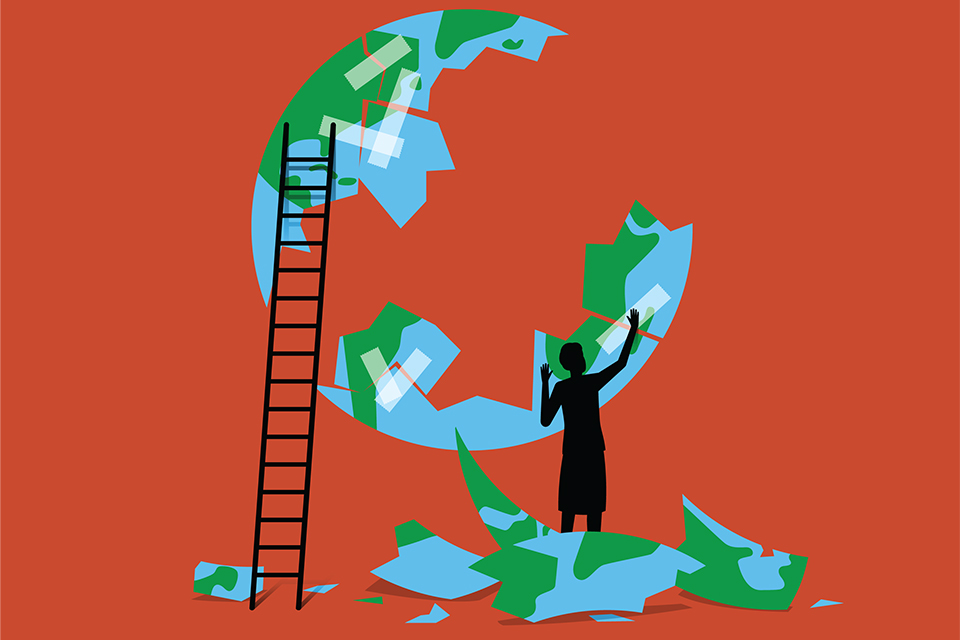
Rabbi Michael Strassfeld '71, MA'72
Strassfeld is the author of "The Jewish Catalog," a series of books first published in 1973 that offered a countercultural, do-it-yourself guide to practicing Judaism. As part of the "havurah movement," he helped redefine tikkun olam for American Jewry, connecting it directly to political action and social justice.
In the 1960s and 1970s, we had the Vietnam War and civil rights movement. The counterculture, which I was a part of, focused on challenging the establishment and changing American society.
We felt elements of the Jewish tradition spoke directly to what we were trying to do. So, for example, the prophetic tradition was seen as a legitimate source for calling for social justice. The prophets in the Hebrew Bible told the kings, "You're doing the wrong thing." They were calling for changes.
This is also when tikkun olam began to mean something different for us than it had in the past. It became the common term for Jews being involved in social justice.
But it was also connected to the traditional idea in Judaism of the Messiah and the Messianic age. The idea was to work to bring us closer to a more perfect world. A significant part of Judaism was helping to make the world better. That was part of what we as Jews do.
In my new book, "Judaism Disrupted: A Spiritual Manifesto For the 21st Century," I talk about how during the six days of creation, God said at the end of each day of creation, it is good. He didn't say it was finished. Finished would be it's done; check that off the list. Good is subjective. It reflects a core principle in Judaism, which is that we live in a moral universe.
A corollary of that is our ability to continue to create the world. We are now the world's co-creators. Our objective is to say it was good at the end of each day. God is calling on us to make the world better and be caring and compassionate toward each other.
For more, see What's Wrong with Today's Judaism? Rabbi Michael Strassfeld Says A Lot.
Samantha Brody '24
Former student president, Brandeis Hillel
Repairing the world is making it a better place than the day before and certainly a better place than before I was born. It covers every possible area of life, whether that's education, social justice, or diversity and inclusion. It covers everything.
On a day-to-day basis, I try to be kind to people. I try to check in on my friends and make sure they're doing okay.
If I see someone stressed in the Hillel lounge or the student center, I'll sit with them for a minute. I especially like to make sure that first-years are doing okay because I know it can be overwhelming. If they're not okay and I can be a resource for them, then that's a small way that I can repair my world.
I think of repairing the world as related to Judaism and integral to how we live Jewishly. We are required as Jewish people to do better unto the world. It's just a sense of responsibility that comes from the Jewish religion.
I'm majoring in education studies, and something that I've been working on, particularly related to Jewish educational spaces, is making sure they're accessible and inclusive for everyone.
I've had a lot of really interesting conversations with people about who is and who isn't participating in Jewish educational spaces. Why aren't they coming? Do they not know about them? Do they not feel welcome?
Every couple of weeks, I teach in the Brandeis Beit Midrash [a dedicated space for studying Jewish texts in Shapiro Hall]. I always make sure that my sources are in English and that I'm explaining everything. I want my students to know they can ask even the silliest questions because they're not silly at all. This is one way I make Jewish education more inclusive and more accessible.
I think repairing the world is ongoing. I don't think there is an end to it, frankly. I don't see it as, "Oh, one day, the world will be repaired." Honestly, I think it's infinite.
Associate professor of environmental studies Prakash Kashwan
To fully understand the challenges involved in repairing the world, we must admit that our world is fundamentally broken in so many different ways.
The effects of climate change are proceeding much faster than the [United Nations] Intergovernmental Panel on Climate Change had suggested. It had been thought that we had until 2050 for the world to achieve net zero greenhouse gas emissions.
New research suggests it's 2035. After that, temperatures will rise 1.5 degrees Celsius above what they were in pre-industrial times, with devastating and potentially irreversible consequences.
The world's broken environmental and climate systems do not exist in isolation from our political and economic systems. This is why I see this as a conjoined agenda: repairing the ecological and environmental damage must be accompanied by repairing the political and economic systems. Otherwise, we will create short-term, band-aid solutions that will not take us very far.
I started my career in international development. We were looking at solutions for deprivation and inequality.
But it seemed to me that while we were doing incredibly important work, it still wasn't deep enough to address the fundamental structural problems needed for repairing the world to take place. I decided that I should be doing more research and digging deeper into some of these questions.
That’s what led me to academia. After 15 years, I feel certain that we need to think more deeply about how academic research and teaching can make this world a better place — more socially just, environmentally resilient, and caring. I'm hopeful we will tackle the civilizational-level challenge we face today.
Assistant professor of philosophy Umrao Sethi
Implicit in the notion of repairing the world is the assumption that there's something we have broken, something that needs fixing. Repair isn’t just a matter of improving the world, but more specifically, rectifying wrongs that we feel responsible for. But to rectify wrongs, we first need a clear understanding of the wrongs themselves.
I grew up in India in the 1980s. Colonialism is one of the wrongs that shapes my family and my country. While it’s true that India was already independent by the time I was born, the country’s history had nonetheless shaped much of my identity.
In my academic work, I think about the nature of consciousness, perception, and the world that we know about through perception. While these questions are universal, my training has been almost exclusively in the Western tradition.
People have often asked me, given my background, why I don’t focus on Indian philosophy. I've asked myself that question and felt guilty about it at several points in my career. Surely, part of what I could do to repair the world is to highlight the rich intellectual traditions that thrived in India at the very same time, if not earlier, than those in the West.
But here’s the problem: Part of what's so devastating about colonialism is the erasure of the local culture, history, and language — really, knowledge of your past and civilization.
To give you a few examples: I grew up learning about the Holocaust before I knew anything about the Bengal famine of 1943, in which three million Indians died. My English vocabulary is many times larger than my Hindi vocabulary.
And so, despite being Indian, I am far more comfortable reading Descartes, Locke, and Kant than reading the Vedas [ancient Indian religious texts essential to Hinduism] or the Upanishads [sacred Hindu scriptures]. Given colonialism's impact on me, when I ask myself what I can do to repair the world, the answer is not as easy as it might first seem.
If I were to start working on the Indian philosophical tradition, I would have to retrain myself in a completely new tradition, learn a new classical language, and familiarize myself with topics that have felt foreign to me my entire life. It would probably take half a lifetime to get the requisite training.
It would also mean one less person of color at a mainstream Western philosophy conference and one less Indian woman in a classroom on Western metaphysics and epistemology.
So I have decided to try and make space for people with backgrounds like mine in spaces traditionally conceived of as white, European, or male and to insist that people like me have as much a right to be in these spaces as anyone else.
If an Indian student or an African student expresses the desire to study Indian philosophy, I will support that to the maximum extent possible. But if they decide to spend their life thinking about Kant's philosophy, I'll support that just as much.
I want them to think that that can be their project as much as anyone else's. Broadening our conception of what belongs to whom is one way I try to repair the world.
